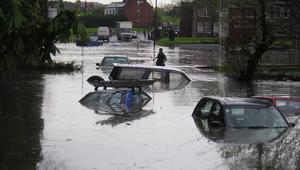Like many other cities, Leeds is vulnerable to extreme weather events and a changing climate. This is especially evident in relation to flooding, where Leeds has direct experience of how extreme weather events can impact on its communities, businesses and infrastructure.
A lot has been done to make the city more resilient to these events – with significant investments in flood protection currently nearing completion. But much remains to be done to increase our preparedness, improve our infrastructure, protect our buildings and strengthen the ability of people and communities to adapt.
Leeds Climate Commission will review the wide range of iniatives relating to weather and climate change, advise on the risks that remain and the priority areas for future initiatives. Funding permitting, it will bring different groups together to develop a climate risk assessment and management plan for the city and for vulnerable groups and businesses within it. This climate risk assessment and management plan will be cross-cutting, with a wide range of options for a wide range of groups and sectors in the city identified, evaluated and prioritised.
Leeds Climate Commission will also advise on the key steps needed to implement these options. It will strengthen networks, build capacities, celebrate successes, transfer good practice and explore ways of raising the investments needed. It will offer independent advice on different options, track progress over time, and seek to change policy and practice to ensure that Leeds’ potential in this area is realised.
UPDATE: a comprehensive database of Leeds-specific, regional and national climate resilience and adaptation policies, programmes and documents has been compiled for Leeds Climate Commission and is now published on Data Mill North. See this report and read the documents.
Image: Kirkstall Road flood defences (courtesy of BMMjv)



